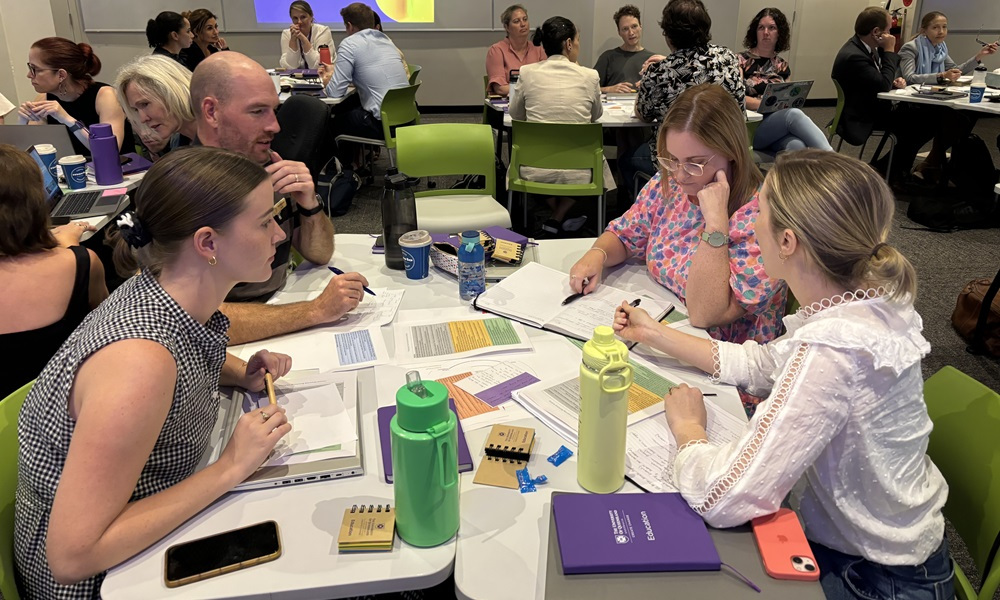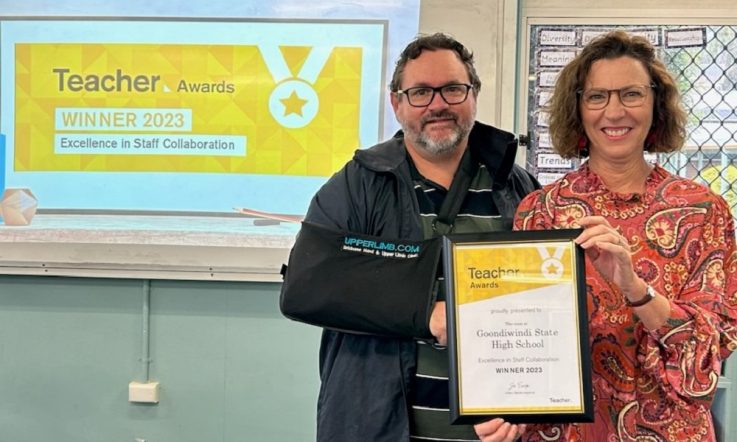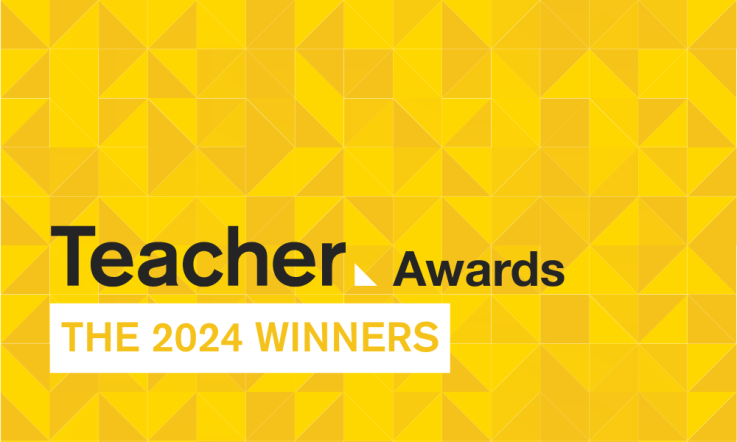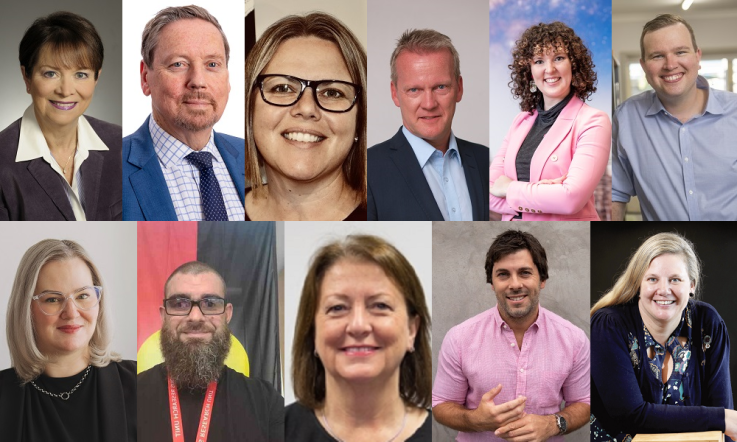The winners of the Teacher Awards 2024 have been announced. In today’s article, we speak with the winning team of the Excellence in Staff Collaboration Award: Georgia Wignall from the Queensland Department of Education, and Emma Hart, Phil Bremner, Madeleine Bell and Chris Bermingham from Balmoral State High School in Brisbane, Queensland.
The Excellence in Staff Collaboration Award category in the Teacher Awards is open to teams of leaders and/or teachers who are working together to improve their practice and lift student outcomes. The 2024 winners – Georgia Wignall, Emma Hart, Phil Bremner, Madeleine Bell and Chris Bermingham – have been recognised by the 2024 Judging Panel for their systematic, whole-school approach to collaboration.
The team are from different faculties at Balmoral State High School, an inner-city Brisbane school with approximately 1,000 students. Georgia Wignall, who is now a Senior Education Officer at the Queensland Department of Education, was formerly Head of Department for Science at the school; Emma Hart is Head of Department for Humanities and Languages; Phil Bremner is a Humanities teacher; Madeleine Bell is a Science and Mathematics teacher; and Chris Bermingham is now Head of Department for Science.
‘We're really proud of this win for us. The team has worked really hard this year for what we've achieved so far,’ Hart tells Teacher. ‘We're really, really pleased that we were able to be recognised for the work that we've done.’
Facilitating cross-faculty collaboration
The Judging Panel recognised the team for the systematic approach presented in the nomination which has resulted in sustainability of the initiative and expansion to other areas of inquiry.
In their Award submission, the team shared how their cross-faculty collaboration came about when Wignall noticed there was room for the school to develop a formal pedagogical approach for teaching research skills, to support students in years 7-12 who were needing strong research skills to complete assigned work.
‘Georgia and I came together [nearly a year ago] and started talking about how we could form some sort of cross-curricular coalition to address the needs of our students and look at the common needs in our learning areas,’ Hart explains. ‘It was really interesting, because it's not a natural crossover that you see commonly in a lot of schools. And when we brought the ideas to the team (both of our faculties), overwhelmingly people were on board to collaborate and to learn from one another and to share what we have found in the classroom. And it's just evolved from there.’
The Excellence in Staff Collaboration Award recognises evidence of an explicit system being in place to deliberately foster collaboration and allow for regular professional discussions to share expertise, knowledge, and learnings across curriculum areas and stages. In their context, Wignall and Hart facilitated joint faculty meetings and formed cross-curricular focus groups to ensure all teachers could contribute to how and when these skills were taught. They also partnered with the University of Queensland’s Learning Lab, which opened up further opportunities to develop a cross-curricular investigation into student motivation to engage with AI. Wignall, Hart, Bremner, Bell and Bermingham are all members of the UQ Learning Lab team.
Finding the time to collaborate
An important part of a project’s sustainability is how it fits into or around existing workloads and responsibilities. For this cross-curricular approach at Balmoral State High School, Wignall explains it was a natural opportunity to enhance cross-collaboration within the existing structures at the school.
‘A lot of that sat within our predetermined faculty meetings – it wasn't an add on, which I think very much helped with that culture. And then when Emma and I put the call out to people wanting to jump on the UQ project or, sort of, smaller staff focus groups, they were willing to jump on because it didn't feel like, “Oh, that's just that extra part that we had to do”. And I think we were quite mindful of that. We wanted to utilise the time that we had and not add on to.’
The project’s focus was key to achieving staff buy-in, Wignall adds. ‘It was something that was valuable – it started with the little seed of “how can we teach researching and referencing better?” – something that all Humanities teachers and all Science teachers needed those students’ skills to get better. So, it was easy for them to buy-in because it’s something they have to do within their teaching.’
‘From a classroom teacher perspective, it's been really valuable to be able to have that cross-faculty time,’ Bell tells Teacher. ‘I'm a Science teacher, so having that faculty time with the Humanities teachers and getting to collaborate outside of, I guess, the day-to-day [of] what we would usually do has been really valuable.’
The investigation of AI was also relevant to many staff at the school and prompted a cross-curricular investigation into student motivation to engage with AI. ‘Our Science and Humanities teachers joined forces and discussed how students use AI at school, and what concerns staff had for how AI will be used in schools in the future. This was valuable as many teachers had similar concerns,’ Bremner tells Teacher. ‘There was a wide range of familiarity with AI amongst teachers; some were very comfortable using it and others had little awareness of which apps and platforms students were using. The valuable feedback and discussion that was generated has helped to inform future policy decisions about the use of AI in our school.’
Wider support for collaboration
Another element of this Award’s criteria is that school leaders provide regular opportunities for teachers to learn from each other's practice, and the team says support from leadership has been crucial to their success. As Wignall has moved into her new role at the Department, the support for this project has been evident there too.
‘Sometimes it feels like hard work, collaborating,’ Bermingham reflects. ‘And the fact that everyone involved has an interest in it has made it made it not really feel like hard work to do it. … It hasn't really felt like hard work getting through it. It's just felt valuable and worthwhile.’
The Teacher Awards will be back for 2025! The Awards recognise work that’s been completed in the past 12 months, so it’s not too early to start thinking about your nomination for next year. You can browse the specific criteria for this award, and the other 7 categories, here.
As you reflect on the 2024 school year, have you had adequate opportunities to collaborate with staff from different faculties? If not, how could you make the time for this in the next school term?
As a school leader, do you provide regular opportunities for teachers to learn from each other’s practice? How does this fit around existing workloads and responsibilities?



